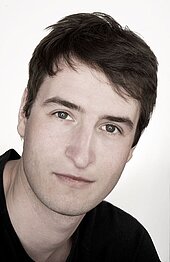Kupper, Fabian
Congratulations on passing the viva voce on 18 September 2013.
Dissertation topic: "Serial Narration. The evolution of the US crime show from 1950-1990."
Scholarship: Doctoral fellowship from the Cusanus Stiftung (1 October 2009-30 September 2012)
Contact address at the University of Würzburg:
Chair of Modern German Literature and History of Ideas
Institute of German Philology / Modern Department
Am Hubland
D-97074 Würzburg
Phone: +49 931 31-85647
Room: 4.O.13
First supervisor: Prof. Dr Wolfgang Riedel
Second supervisors:
Prof. Dr Roland Borgards
Class in the Graduate School: "Philosophy, Languages, Arts"
Doctorate in the Graduate School since WS 2009/2010.
Abstract:
When Jason Mittell published his groundbreaking essay on Narrative Complexity in 2006, he briefly shaped the evolution of a storytelling medium that had once represented the banality of the "Kulturindustrie" (Horkheimer/Adorno) for decades: the television narrative.
While TV series were still being considered an academic side issue in the eighties, the growing market of DVD sales and the consequently re-release of almost forgotten television series has created completely new conditions for academic research studies. Since 2005, the structural and semantic transformation of this narrative medium has been observed but hardly studied systematically. The main characteristics that favour the television series as a subject of academic interest, is its great reliance on genres and schemes but also high reproduction rates. Due to the enormous pressure to innovate the constant favourite stories on detectives, couples and lawyers, a quite simple structured narrative formula has constantly evolved to a multi-layered, highly elliptic and dynamic storytelling mode - not least because of a wide reception and a growing understanding of schemes and narrative grammar on the side of the viewer. The present project aims to explore this structural process of transformation, that illustrates thethesis of narratologist David Bordwell, who insightfully stated that "narrative art ruthlessly exploits the tentative, probalistic nature of mental activity".
When Jason Mittel presented his essay on Narrative Complexity in 2006, he briefly outlined the evolution of a narrative medium that had represented the profanity and banality of the culture industry like no other for decades: the TV series. In the eighties and nineties still a marginal topic of cultural studies (film studies, philology, visual studies), a completely new source situation was created at the beginning of the noughties through the commercialisation of old archive holdings of a growing DVD distribution. Since 2005, the structural and semantic development of the complexity of a narrative medium has gradually been analysed, which is exposed to a permanent pressure to innovate due to the high degree of schematism of its narrative grammar as well as high reproduction rates, and which has systematically and comprehensibly developed from a product of the entertainment industry into a sovereign art form. This project examines the structural development of the crime show from 1955-2005 using eighteen prominent examples and sheds light on the transformation processes of a medium that illustrate the core thesis of Bordwell's great narratologist: Narrative art ruthlessly exploits the tentative, probalistic nature of mental activity.






